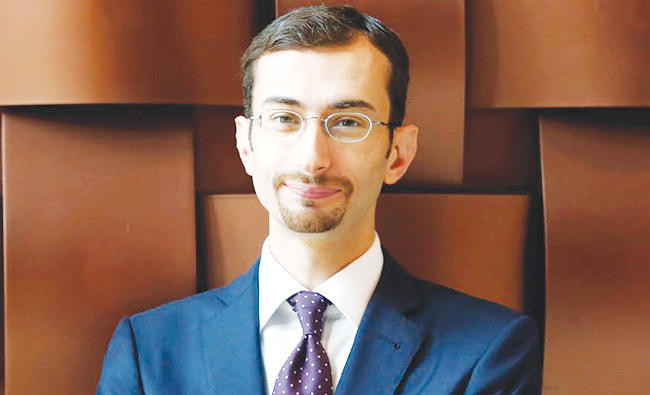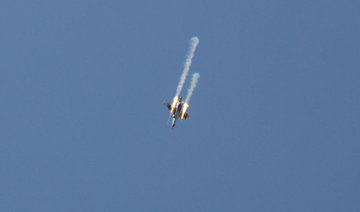JEDDAH: A former US diplomat and political analyst said US President Donald Trump’s strike against the Bashar Assad regime sends a clear message to rogue states and dictators that they should not mess with the new American administration.
“There is a new sheriff in town,” said Ali Khedery, former special assistant to five US ambassadors to Iraq and senior adviser to three four-star chiefs of US Central Command, during an interview with Arab News on Friday.
“Barack Obama is mercifully gone, and now there is a new American president — one who is not only willing to speak but willing to act.”
According to Khedery, Trump has now laid down a marker for Assad and his patrons and allies — namely the Lebanese Hezbollah, Iran’s Revolutionary Guards, the Iraqi Shiite militias and Russia.
“President Trump and his national security team are men of action who will not grant dictators such as Assad carte blanche to murder innocent civilians with impunity, particularly using weapons of mass destruction.”
He described Trump’s action as perfect. “Frankly I think that President Trump and his national security team played it perfectly. This is exactly what the world expects from the United States of America, which is the world’s only superpower,” he said.
“This (the chemical attack on Khan Sheikhun in Idlib, Syria) was a clear instance where international treaties were broken, where international norms were violated, where a dictator used weapons of mass destruction to kill and wound hundreds of his own innocent civilians.”
He said the world expected and deserved a swift assessment, a swift decision, and swift action from the president of the US. “This was a flawless performance by President Trump, particularly when you factor in that there was no collateral damage associated with the cruise missile strike,” said Khedery.
Describing the airstrikes as “a goldilocks decision” — one that was just right — Khedery said: “This was neither an under-reaction nor an over-reaction. It was a very swift and proportional response to Assad’s use of weapons of mass destruction against civilian members of his population. Tomahawk cruise missiles were directed at the airbase where the attack was apparently planned and where the aircraft that carried out the attack are based. So the missiles hit the taxiways, the aircraft, the fuel depots, the ammunition dumps, and the command and control facilities behind the use of weapons of mass destruction.”
He said if Trump had not acted now, his administration would have been partially paralyzed. “If he had not acted, if he had shied away from the task, he would have lost enormous credibility very early into his presidency and his credibility would have been fatally damaged for the next four years,” he said.
“This swift and measured missile strike will clearly resonate with rogue states and non-state terrorists, beginning with Russia, North Korea, Iran, Assad, Hezbollah, Daesh and Al-Qaeda.”
He said the reasoning put forward by the Obama administration — that any action in Syria would result in catastrophe because it would involve Russia — was not correct.
“Russia did not have a massive overt presence in Syria when the first series of major attacks using chemical weapons took place in 2013. What happened was Assad and his Iranian patrons slowly began to test the West’s resolve and to commit more and more war crimes,” Khedery said.
“First, they started with Scud missiles against civilians; then they started using cluster bombs; then they used incendiary weapons, and then barrel and chlorine bombs. As the rebels made more and more progress, Damascus began using chemical weapons. They had several test cases when they used small amounts and the West knew and did not do anything. And then in 2013, Assad used chemical weapons in a particularly egregious way when more than 1,000 innocent civilians were killed and wounded in Ghouta — this was after President Obama’s self-imposed red line. Even then, he did not respond. Obama fatally damaged his credibility when he did not enforce his red line and respond with military action using the authorities granted to American presidents under the War Powers Act. Instead, Obama unnecessarily went to Congress seeking permission, knowing that Congress was too divided and disorganized to formulate a coherent response,” he said.
According to Khedery, such lack of action was misused by Assad and his Iranian masters. “They saw that they had a free hand to murder the Syrian population. That deeply undermined the Western coalition, led by the United States.”
“Through this decisive and proportional response, President Trump has just gone a long way toward restoring America’s damaged credibility across the Middle East and the globe,” said Khedery.
“What has just happened sends a very clear signal that President Trump, along with Secretary of Defense Jim Mattis, Secretary of State Rex Tillerson, and National Security Adviser H.R. McMaster are serious men. I have worked personally with all three of the latter: Believe me, these are men who are not to be messed with.”
On whether these strikes were a one-off action, Khedery said: “I think it is too early to tell. We are only two and a half months into the Trump administration. However, it should be clear by now that President Trump is not a man to be underestimated. He is well advised. He is thoughtful. He is decisive. And he is tough. So you should not test his resolve in ways that dictators and terrorists were able to do with President Obama, who literally enabled them to get away with mass murder with impunity.”
He said the airstrikes were an implicit warning to Iran. “Certainly, Iran will now think twice before harassing the United States in Afghanistan, Iraq, Syria, the Strait of Hormuz, or the Bab Al-Mandab. They will certainly give harassment an additional thought now,” he said.
“But I don’t believe that they will stop by any stretch of the imagination. In fact, I am quite certain that Iran will continue with its murderous and malign activities across the region just because Iran has very clear regional hegemonic ambitions and no moral standards to constrain their conduct.”
He said the Trump administration does not intend to allow Iran to continue to get away with “murder, ethnic cleansing, mass state sponsorship of terrorism, and other destabilizing activities” without a response. “You will see over the coming weeks, months and years a reinvigorated American resolve across the Middle East. The United States will once again stand firmly with our allies against our enemies, starting
with Iran,” said Khedery.


























